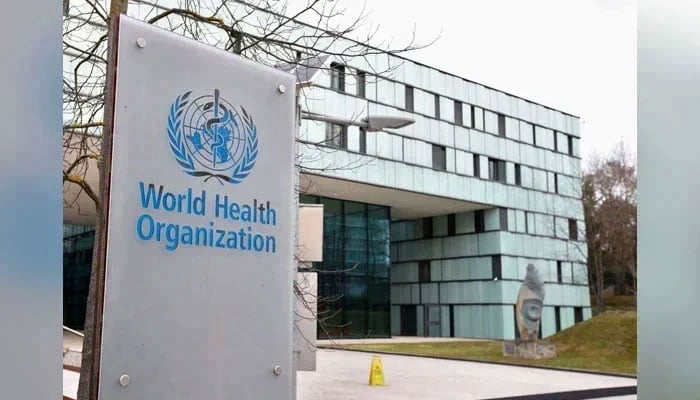Pakistan among 5 high-burden countries as TB resurges: WHO
In WHO’s Global Tuberculosis Report 2024, newly diagnosed TB cases rose to 8.2 million in 2023
ISLAMABAD: Tuberculosis (TB) cases reached record highs in 2023, with Pakistan among top five countries driving the global burden, World Health Organisation (WHO) report revealed on Tuesday.
Pakistan, along with India, Indonesia, China and the Philippines, accounted for over half of 10.8 million TB cases worldwide, reflecting an ongoing public health challenge despite treatment and prevention tools.
In WHO’s Global Tuberculosis Report 2024, newly diagnosed TB cases rose to 8.2 million in 2023, up from 7.5 million in 2022 — highest number since global monitoring began in 1995. TB claimed 1.25 million lives, making it the leading infectious disease killer in 2023 and surpassing Covid-19.
“TB remains a global health threat, particularly in high-burden countries like Pakistan”, said WHO Director-General Dr Tedros Adhanom Ghebreyesus. “We urge all nations to fulfil commitments to expand tools for TB prevention, detection, and treatment to end TB once and for all”, DG said.
While TB-related deaths saw a modest decrease — down from 1.32 million in 2022 — , the disease continues to spread rapidly in resource-constrained settings, with high undernutrition, diabetes, smoking and HIV infection acting as major risk factors. Nearly 56pc of global TB burden in 2023 was concentrated in Pakistan and its neighbouring high-burden countries.
Further complicating TB’s eradication is the rising incidence of multidrug-resistant TB (MDR-TB), a severe form that resists common treatments and is closely linked with antimicrobial resistance. In 2023, only 44pc of MDR/RR-TB cases were diagnosed and treated, with a treatment success rate of 68pc, illustrating challenges faced by health systems in tracking and managing this resistant strain.
Despite national and international efforts to counter TB, funding shortages persist. In 2023, low-and middle-income countries (LMICs) required $22 billion to effectively combat TB, but only managed to secure $5.7 billion (26pc of this target). The WHO’s report underscores a significant number of TB-affected households face catastrophic costs, exceeding 20pc of their annual income, to access necessary TB care and treatment.
Dr Tereza Kasaeva, Director of WHO’s Global Tuberculosis Programme, called for urgent, multisectoral action, emphasizing, “Funding shortfalls, financial burdens on patients, conflict, climate change and drug-resistant strains are hampering progress in controlling TB”.
Addressing TB, she noted, requires united efforts to tackle these barriers, as well as increased funding and research into diagnostics, treatments and vaccine development.
The WHO’s push for TB vaccine research highlights unmet need, with only 20pc of $5 billion annual target for TB research reached in 2022. TB Vaccine Accelerator Council is actively working on advancing this agenda.
World Health Organisation also calls for action on commitments made at 2023 UN High-Level Meeting on TB, urging governments, donors and global partners to translate pledges into effective strategies. The targets set for 2027 remain off-track, with further progress needed to reduce TB cases and deaths globally. Dr Ghebreyesus emphasised fight against TB requires immediate, concerted efforts to meet global milestones and ensure effective, accessible TB care reaches those most in need.
-
 Prince Harry Warns Meghan Markle To 'step Back'
Prince Harry Warns Meghan Markle To 'step Back' -
 Selena Gomez Explains Why She Thought Lupus Was 'life-or-death'
Selena Gomez Explains Why She Thought Lupus Was 'life-or-death' -
 New Zealand Flood Crisis: State Of Emergency Declared As North Island Braces For More Storms
New Zealand Flood Crisis: State Of Emergency Declared As North Island Braces For More Storms -
 Nancy Guthrie Case: Mystery Deepens As Unknown DNA Found At Property
Nancy Guthrie Case: Mystery Deepens As Unknown DNA Found At Property -
 James Van Der Beek's Brother Breaks Silence On Actor's Tragic Death
James Van Der Beek's Brother Breaks Silence On Actor's Tragic Death -
 Megan Thee Stallion On New Romance With Klay Thompson: 'I'm Comfy'
Megan Thee Stallion On New Romance With Klay Thompson: 'I'm Comfy' -
 Nicole Kidman Celebrates Galentine’s Day Months After Keith Urban Split
Nicole Kidman Celebrates Galentine’s Day Months After Keith Urban Split -
 Justin Bieber Unveils Hailey Bieber As First Face Of SKYLRK In Intimate Campaign Debut
Justin Bieber Unveils Hailey Bieber As First Face Of SKYLRK In Intimate Campaign Debut -
 Caitlin O’Connor Says Fiance Joe Manganiello Has Changed Valentine’s Day For Her
Caitlin O’Connor Says Fiance Joe Manganiello Has Changed Valentine’s Day For Her -
 Rachel Zoe Sends Out Message For Womne With Her Post-divorce Diamond Ring
Rachel Zoe Sends Out Message For Womne With Her Post-divorce Diamond Ring -
 James Van Der Beek's Final Conversation With Director Roger Avary Laid Bare: 'We Cried'
James Van Der Beek's Final Conversation With Director Roger Avary Laid Bare: 'We Cried' -
 Jaden Smith Walks Out Of Interview After Kanye West Question At Film Premiere
Jaden Smith Walks Out Of Interview After Kanye West Question At Film Premiere -
 Michelle Obama Gets Candid About Spontaneous Decision At Piercings Tattoo
Michelle Obama Gets Candid About Spontaneous Decision At Piercings Tattoo -
 Why Halle Berry Wasn't Ready For Marriage After Van Hunt Popped Question? Source
Why Halle Berry Wasn't Ready For Marriage After Van Hunt Popped Question? Source -
 Bunnie Xo Shares Raw Confession After Year-long IVF Struggle
Bunnie Xo Shares Raw Confession After Year-long IVF Struggle -
 Brooks Nader Reveals Why She Quit Fillers After Years
Brooks Nader Reveals Why She Quit Fillers After Years




